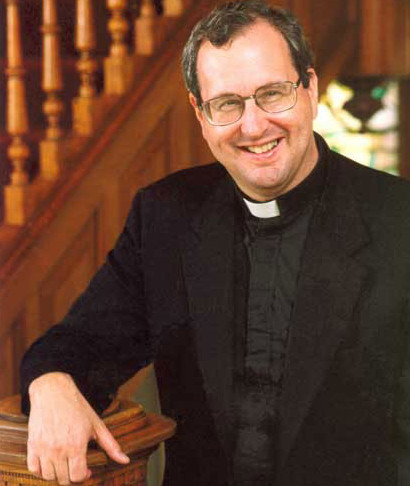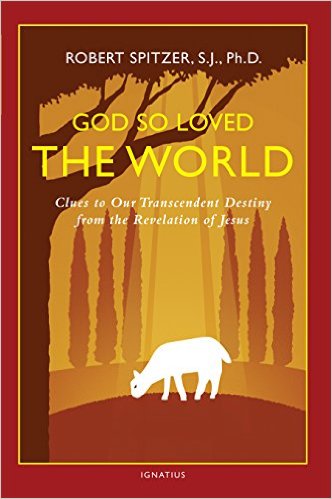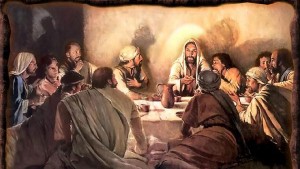We continue with part 2 of our discussion with Fr. Spitzer….
For part 1 of our conversation visit here
In our conversation with Fr. Robert Spitzer, S.J., we enter into “God So Loved the World: Clues to Our Transcendent  Destiny from the Revelation of Jesus“, which is the third installment of his “Happiness, Suffering, and Transcendence” series. Not only is Fr. Spitzer a brilliant theologian, but he has the heart of caring pastor who understands the needs of the questing minds of so many lost and wandering souls. With an extraordinary grasp of philosophy, theology and cosmology, he is able to take complicated concepts and mix them with joy, beauty, and a grace-filled enthusiasm without doing damage to the subject matter. In this volume, he addresses “What is LOVE”, “Who is LOVE”, and maybe in an even deeper way, “The why of LOVE”. Of course we know, “God is Love”, but God as a Father? God as a Son? God as Holy Spirit? How is the mind to grasp such penetrating Truth? And more importantly, how is the heart to perceive this eternal divine mystery?
Destiny from the Revelation of Jesus“, which is the third installment of his “Happiness, Suffering, and Transcendence” series. Not only is Fr. Spitzer a brilliant theologian, but he has the heart of caring pastor who understands the needs of the questing minds of so many lost and wandering souls. With an extraordinary grasp of philosophy, theology and cosmology, he is able to take complicated concepts and mix them with joy, beauty, and a grace-filled enthusiasm without doing damage to the subject matter. In this volume, he addresses “What is LOVE”, “Who is LOVE”, and maybe in an even deeper way, “The why of LOVE”. Of course we know, “God is Love”, but God as a Father? God as a Son? God as Holy Spirit? How is the mind to grasp such penetrating Truth? And more importantly, how is the heart to perceive this eternal divine mystery?
We were able to meet with Fr. Spitzer for this discussion at his offices located at the Magis Center in Garden Grove, CA.
Podcast: Play in new window | Download (Duration: 27:33 — 37.8MB) | Embed
Subscribe: Apple Podcasts | Spotify | Amazon Music | Android | Pandora | iHeartRadio | JioSaavn | Podchaser | Gaana | Podcast Index | Email | TuneIn | Deezer | Anghami | RSS | More
 You can find the book here
You can find the book here
From the book description:
In this volume the brilliant Fr. Spitzer probes in detail the major question that if an intelligent Creator God – manifest in logical proofs, scientific evidence, and near death experiences – who is the source of our desire for the sacred, and the transcendental desires for truth, love, goodness, and beauty, would want to reveal himself to us personally and ultimately.
He then shows this is reasonable not only in light of our interior experience of a transcendent Reality, but also that a completely intelligent Reality is completely positive–implying its possession of a completely positive virtue – namely “love”, defined as agape.
This leads to the question whether God might be unconditionally loving, and if he is, whether he would want to make a personal appearance to us in a perfect act of empathy – face to face. After examining the rational evidence for this, he reviews all world religions to see if there is one that reveals such a God – an unconditionally loving God who would want to be with us in perfect empathy. This leads us to the extraordinary claim of Jesus Christ who taught that God is “Abba”, the unconditionally loving Father.
Jesus’ claims go further, saying that He is also unconditional love, and that his mission is to give us that love through an act of complete self-sacrifice. He also claims to be the exclusive Son of the Father, sent by God to save the world, and the one who possesses divine power and authority. The rest of the book does an in-depth examination of the evidence for Jesus’ unconditional love of sinners, his teachings, his miracles, and his rising from the dead. As well as the evidence for Jesus’ gift of the Holy Spirit that enabled his disciples to perform miracles in his name, and evidence for the presence of the Holy Spirit today.


